- Home
- Barry Lyga
MARVEL's Avengers: Infinity War: Thanos Page 6
MARVEL's Avengers: Infinity War: Thanos Read online
Page 6
“You gave me no choice—”
“I gave you every choice!” A’Lars thundered. The tattered remnants of his compassion, shredded by anger, blew away. “I gave you the choice to obey my commands and leave your mother alone! Do you have any idea how much harm she would have done to herself had not the synths intervened when they did? As it is, she seriously damaged one of them, and now I will have to spend at least a day salvaging it.”
“I weep for your pain,” Thanos said with great sarcasm. He touched his eyes for a moment; his fingers came away dry. “Ah. Apparently not.”
A’Lars fumed. “Your punishment will be greater than you—”
Thanos shook his head wildly. “Father, there’s no time for you to discipline me for such a small infraction—”
“Small? You were explicitly told—”
“—not when there are more urgent and existential matters to consider.” Thanos turned to the desk and the multitude of holograms that floated there. Where to begin?
A hand clapped onto his shoulder and spun him around. A’Lars seethed. “I am not accustomed to my child dismissing me so. And I will not become accustomed, do you understand me, boy?”
For the first time, Thanos noticed that he was taller than his father. Broader, too. A’Lars was a mere two meters tall and slender, whereas Thanos was at least a deci taller and disproportionately broader. It had happened more than a year ago, he realized, but he’d never felt it so viscerally before. Now, in this moment, he knew that he could end the argument in no uncertain terms with the simple expedient of a strong slap across his father’s face.
The idea—the image—raced through him, shuddering as it went. He repressed it with brute willpower.
“Father, there is no time for us to argue. Our world is imperiled, and I need your wisdom to save it.”
A’Lars opened his mouth to speak, then closed it. He shook his head and took a step back, as though he knew on some deeper, more instinctive level that Thanos had considered striking him.
“Imperiled? Thanos, your mother’s madness has infected you.”
The mention of Sui-San again enraged Thanos. How dare A’Lars, the man who’d imprisoned her, speak so flippantly of her? Fists clenched, Thanos once again exercised enormous restraint. After long moments, he relaxed and unclenched his fists.
“Father, I need your help.”
It had worked with the synths, and now it paused the anger of their creator. A’Lars sighed. “You are… of a certain age. Certain urges and desires are understood, and are now being sublimated into this antirational foolishness. I will arrange for—”
“Damn your arrangements, Father!” Thanos thundered. “I am not a sex-starved adolescent yearning for consummation! I am your son; I am your equal in intellect, and I am telling you that our people are doomed!”
Silence fell in the room, a silence as swallowed and whole as in the confines of the silencurium.
“Doomed, you say?” When A’Lars finally spoke, it was with a haughty, sly humor. “Doomed.”
Thanos had expected a different reaction from his father. Fear, perhaps. Or, more likely, a knowing nod of the head, a flash of paternal pride, an acknowledgment that his offspring had achieved something enormous. Some part of him had suspected that perhaps A’Lars already knew what he himself had discovered in the past few days.
Instead, A’Lars regarded him with scorn.
“Doomed, Father,” Thanos pressed on. “The numbers add up. I’ve done the math. We are massively overpopulated….”
A’Lars barked a laugh and waved his hand dismissively, but Thanos continued:
“Massively overpopulated. Yes, you’ve mitigated the crowding somewhat with the MentorPlexes, staving off the worst of the impact, but that can’t last forever. We’re going to run out of room. And matériel. The resultant environmental catastrophe will—”
A’Lars shook his head slowly and sadly. Thanos gritted his teeth and changed tactics.
“Such overcrowding also impacts hygiene and germ breeding. Even if you’re able to hold off the environmental impact of building more MentorPlexes and feeding the people within them, my models project multiple and eventually constant plague-level pathogens. Global pandemics that will devastate the population over and over. Because nature always seeks balance, and nature has no sympathy or compassion.”
Like you, he thought, but did not say.
A’Lars said nothing for a long time. So long that Thanos had time to replay everything he’d said. Had he left anything out? He didn’t think so. It had been two score sleepless hours since the realization hit him, since Sintaa’s offhand comment about the overflow being directed up had made him think of the cryomagma beneath the Eternal City and its environs, made him think of what would happen if the cryovolcanoes erupted, spewing ammonia and methane into the atmosphere. From there, he’d begun thinking of how to protect Titan from an environmental disaster, and while developing evacuation plans, he’d realized just how many people lived in the Eternal City. How many were crammed into this space. How many more were born every minute of every day. Titans were healthy, long-lived people; they died infrequently and yet they kept breeding, and the result was a world rapidly draining itself dry.
With science and with technology, they had forestalled the inevitable. But it was inevitable. The very same technology that delayed their doom merely changed probabilities and created new inevitabilities. When the reckoning came, it would be catastrophic.
The problem with Titan was not Titan itself, was not the cryovolcanoes and the threat of their freezing ammonia and methane.
The flaw in Titan was too damned many people.
I should have said that. I should tell him that—with exactly those words.
He opened his mouth to speak, but A’Lars cut him off.
“I don’t know what failure of mine led you to this pass,” his father said, his voice bitter and harsh, “but rest assured I will not allow you to infect our world with your fantasies of blight and rescue. No doubt you imagine that your ‘discovery’ will change people’s perceptions of you. You see yourself as a hero, yes?”
Thanos looked down at the floor. A part of him, yes, imagined the relief and gratitude that would be his reward for his discovery. But that mattered little compared to the discovery itself.
“Father,” he protested, “my math is impeccable. Data do not lie. Here.” He picked up a ChIP, on which he’d encoded all his research and data. “Take this. Examine it yourself. You’ll see that I am…”
To his shock, A’Lars slapped the ChIP from Thanos’s hand. “Your bravado,” he scoffed, “is outstripped only by your hubris, Thanos. To think that you could perceive what I have not? What the others who run our world have not?” A brief, fragile laugh spurted from between A’Lars’s lips. “Speak of this to no one, and count yourself fortunate that you’ve embarrassed yourself before only me, not the public.”
“You would rather die than face the truth?” Thanos was incredulous.
“That’s a false dichotomy. I don’t have to choose between the two. Truth is objective and eternal, Thanos. It lives on independent of us.”
“Cold comfort from a grave.”
With a noncommittal grunt, A’Lars turned to leave, pausing for a moment at the door to look back. “And rest assured that we will still have a conversation about the appropriate punishment for your visit to your mother.”
Thanos stood perfectly still and expressionless until the door slid shut on his father, leaving him alone again.
And then he cried out with pain and frustration and embarrassment, lifted his desk with his bare hands, and hurled it against the wall. It crashed with a resounding thud and a tinkle of glass, split almost down the middle but still intact. So he hefted it and swung it against the wall, this time satisfied as the desk splintered into pieces, crumbling in his hands.
He turned his ire on the rest of the furniture in the room, and by the time he was done, there was not an intact item left. His r
oom had become a junkyard of bent, broken, and crushed metal, glass, and plastic. Every step brought the satisfying crackle of something breaking even further under his foot.
His back to a wall, Thanos sank to a sitting position, staring straight ahead. From above, the lights—damaged during his rampage—flickered, raising and killing shadows all around him. He did not move, but the random bursts of light made the room itself seem to shift and jitter in his orbit. He was at the center, the fulcrum, the focus, as light and dark played and warred. Steeped in darkness, exposed in light, he was the same. Resolute.
And he was right.
He was right. He knew it to be true. He could see the end of Titan, the death of everything that lived in his world, and even his own father was too blind to see it.
A pile of wires and scraps of metal rested next to him. Absently, he brushed it aside with one sweep of his hand.
Beneath, a ChIP glimmered at him in the failing light. Thanos plucked it from the debris surrounding it and slid it into the port on his wrist. Data streamed to his headgear. It was the ChIP he’d meant for A’Lars, a copy of all his data.
Our world is dying. So slowly that no one can see it.
He sat there for hours, triple-checking his math, then quadruple-checking it. A part of him yearned to be proven wrong, to find a mistake, even a simple one, one that a child would see. Anything at all. He wanted so desperately to be wrong, to submit to self-mockery, to have to debase himself by going to A’Lars and saying those dreaded words: Father, I was wrong, and you were right.
But no matter how much he looked and calculated and recalculated, he could not find a flaw in his thinking or his conclusions.
Titan was doomed.
The fall of his race was inevitable.
He ejected the ChIP and sighed heavily. Inevitable. Nature would take its course. The people of Titan could stave it off as long as possible with their technology, but in the end, death would ride through the Eternal City and dim its lights to utter blackness.
Inevitable.
He drifted off to sleep, thinking that word. It echoed in his mind, a sickening lullaby.
As he awoke unknowable hours later, his head jerking up from his chest, he thought, Inevitable… but not unstoppable.
There was a way. The inevitability was a predicted outcome that relied on no one doing anything. On the present course of Titan remaining unchanged.
But there was a principle of physics that decreed that the more accurate the determination of a particle’s direction, the less accurate the determination of its momentum, and vice versa. That the very process of observing, of sending photons to ricochet off the particle in the first place, inevitably—inevitably—changed either the direction or the momentum, making it impossible to ascertain both to the same degree of accuracy.
He was the photon, he realized. Titan’s fate could change. Because he was observing it. Which meant that he could do something to change it.
He would do more than identify the problem; he would solve it. And when he brought a solution to A’Lars, then—finally—his father would listen.
He summoned a brace of androids from the storage room. “Clean this up,” he told them, “and install a new interface desk.”
They beeped and chirped happily as they set about their tasks. Thanos watched them work; unless he succeeded, when the end came, they would be all that would survive.
CHAPTER VII
A DAY LATER, HE FOUND HIMSELF IN A CORRIDOR OUTSIDE Gwinth Falar’s residence. She shared quarters with her family—two parents, four siblings, two married relations, a niece, and two nephews. The corridor was crowded with commuters leaving their own domiciles for the day; Thanos was an unwelcome intrusion into their routine. Snarls and complaints thickened the air in his wake.
“I apologize for abandoning you the other night,” he told Gwinth when she commed him from the security camera. “You inspired me to do something I had been putting off for many years.” He paused, considering for a moment not telling her what he’d done, but then discarded the idea. She needed to know. “I saw my mother for the first time since my birth. You gave me the courage to do that. You inspired it.”
The door slid up an instant later, as though she’d been waiting just beyond it for exactly those words. Her expression mingled shock and sorrow and something else that it took him a moment to identify, so unfamiliar was it to him:
Compassion.
“You saw your mother?” Like everyone on Titan, she knew that Sui-San had been locked away.
“After a fashion,” he conceded, stretching out his hand to her. “I meant to come back to you right away, but… something intervened. Something enormous. Will you walk with me?”
Her hesitation did not offend him. It was only sensible, and in any event, it wasn’t long. She took his hand. “Of course.”
He led her to the outskirts of the Eternal City, close to the edge of the safe terraformed zone. The foothills of the cryovolcanoes were smooth and peaceful. Deep beneath, cryomagma burbled and crackled with cold.
“We’re all going to die?” she said when he finished explaining his epiphany to her.
“All that lives, dies,” he told her. “The catastrophe my model predicts relies on a broad array of variables, but it will occur. It could be next month. Or it could be as long as ten generations from now.”
“Ten generations…” Gwinth murmured.
“By which point you and I will have been long dead anyway. But, yes, everything we see here”—he gestured to the sweeping skyline of the Eternal City—“will be gone, and everyone within no more than dust. Unless we act.”
Her eyes searched his features as though they held the answer. “You can save us?” she asked at last.
“I believe I can. The question is, should I? The cataclysm is enormous; the price to be paid to stop it cannot be small.”
“We’re talking about the survival of our entire species, our way of life,” Gwinth told him. “You have to do it. You have to do whatever it takes, Thanos. Save Titan.”
He paused, then bent to her and kissed her. The connection was still there. It wasn’t a fluke or a side effect of his first kiss. It was real and it was pounding in his heart like blood.
Yes. Yes, this was worth the price, any price, to save.
Thanos approached his father not with fear or dread but rather with certainty. Certainty that A’Lars would reject him once again. He knew that his father had no love for him and little respect, yet some intractable filial impulse compelled him to give his father one more chance to be a part of the solution that Thanos knew could save the world.
“Father, I would like to speak with you,” he said, standing at the door to A’Lars’s cogitarium. “It is a matter of some urgency.”
After several seconds, the response came through the comm mounted next to the door. “Is the world about to end?” A’Lars said with some asperity.
Thanos chose to treat the question as genuine, not rhetorically sardonic. “Eventually, yes. Not in the near term, I believe.”
There was no rejoinder. No scoffing. No scorn. A’Lars simply said nothing more.
Thanos waited at the door for close to an hour, but his father did not speak, nor did he emerge.
And so Thanos took matters into his own hands.
Holograms were simple manipulations of photons. And sound was merely the vibration of air molecules. Transmitting a fully audible hologram had been perfected long ago. It was science so simple that few people even thought of it as science any longer. It was just part of life.
Thanos needed something a little more robust than the typical hologram, though. He needed to broadcast to every person who lived on Titan, in a way that could not be ignored.
If A’Lars would not take him seriously, then he would put his ideas into the hands of the entire population. Let them take action while his father sat safely ensconced behind the doors of his study, planning the next MentorPlex that would only stave off the catastrophe he didn’t
even believe in, and doing nothing to stop it.
Thanos developed a hologram of himself that was a hundred meters tall, with a series of photonic refractor particles that would make the hologram appear to be facing whoever was looking at it. His appeal would be personally directed to every individual in the Eternal City. He considered using a different image, perhaps even that of his father. But that would be a fraud. He was about to communicate a great and horrible truth to his people; he could not open with a lie.
He had data that indicated precisely when the greatest number of people were outdoors. He generated the hologram at that time, projecting it via a series of gliding androids such that it loomed over the City. At first it did nothing, merely “stood” in midair. It didn’t take long for people to notice, for skycars to drift through it and pause, causing worse traffic congestion than was usual in the skyways.
From buildings and from the street, from vehicles and from rooftops, the people of the Eternal City looked up, and when Thanos was certain he had the attention of as many Titans as possible, he allowed his hologram to speak its message.
“I am Thanos, son of A’Lars and Sui-San. My people, my fellow Titans, I greet you with great love and with greater fear. Our world is imperiled, and we must act boldly to save it.
“We are—by every measure that matters—a great people. We have conquered the wilderness of Titan and bent it to our will. We have raised mighty structures, tamed the cryovolcanoes, built monuments of art and science and achievement.
“And it will all be for naught. For we are doomed.”
He proceeded to recite a series of statistics about arable land, recyclable water volumes, death rates, and birth rates. He spoke briefly about pathogens and disease. With a collection of holographic charts and graphs, he explicated the rapid diminution of the metal ore that would be needed to continue to construct enough MentorPlexes to house the burgeoning population.

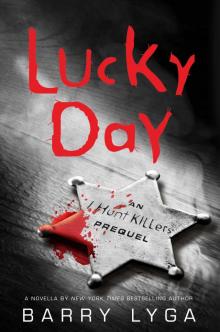 Lucky Day
Lucky Day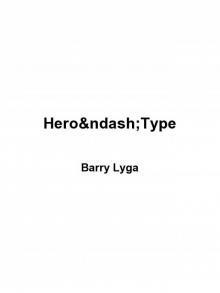 Hero-Type
Hero-Type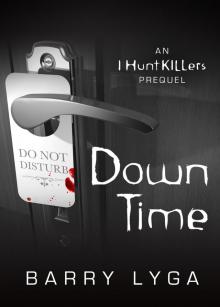 Down Time
Down Time Blood of My Blood
Blood of My Blood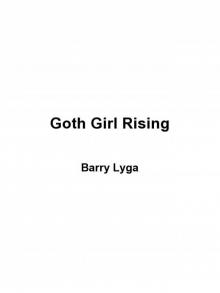 Goth Girl Rising
Goth Girl Rising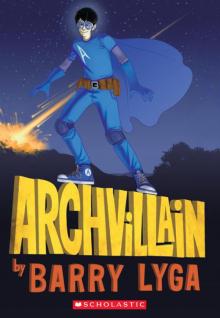 Archvillain
Archvillain Boy Toy
Boy Toy Game
Game Bang
Bang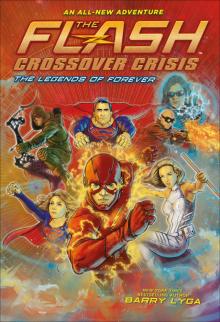 The Legends of Forever
The Legends of Forever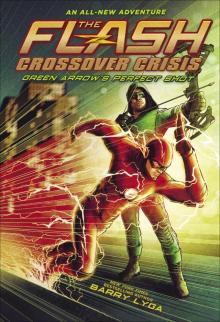 The Flash: Green Arrow's Perfect Shot
The Flash: Green Arrow's Perfect Shot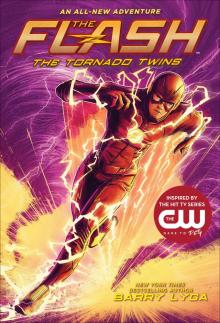 The Flash: The Tornado Twins
The Flash: The Tornado Twins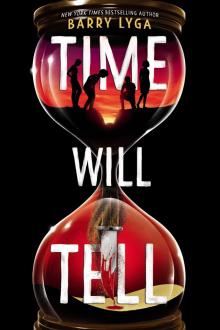 Time Will Tell
Time Will Tell The Secret Sea
The Secret Sea The Hive
The Hive Career Day
Career Day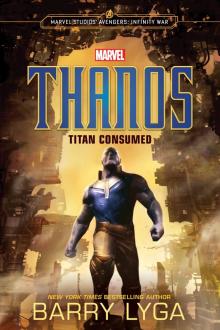 MARVEL's Avengers: Infinity War: Thanos
MARVEL's Avengers: Infinity War: Thanos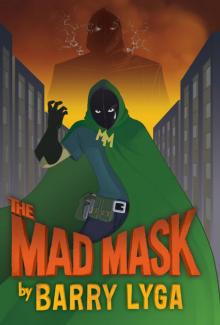 The Mad Mask
The Mad Mask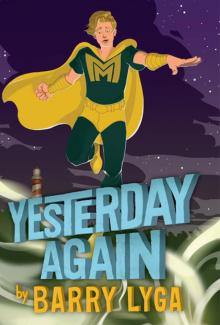 Yesterday Again
Yesterday Again I Hunt Killers
I Hunt Killers Blood Boy
Blood Boy Neutral Mask
Neutral Mask The Astonishing Adventures of Fanboy and Goth Girl
The Astonishing Adventures of Fanboy and Goth Girl I Hunt Killers Neutral Mask
I Hunt Killers Neutral Mask Neutral Mask: an I Hunt Killers prequel
Neutral Mask: an I Hunt Killers prequel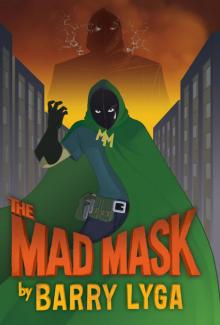 Mad Mask
Mad Mask Blood Boy: an I Hunt Killers prequel
Blood Boy: an I Hunt Killers prequel I Hunt Killers Blood Boy
I Hunt Killers Blood Boy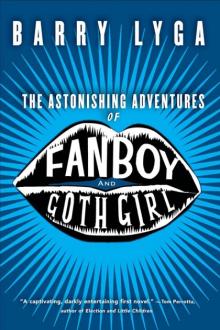 The Astonishing Adventures of Fan Boy and Goth Girl
The Astonishing Adventures of Fan Boy and Goth Girl